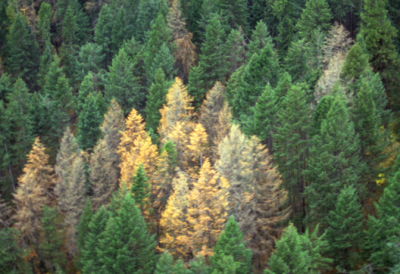Under normal circumstances, Douglas-fir beetles only hasten inevitable decomposition. But a somewhat vicious cycle has resulted in a greater number of weakened trees and increased Douglas-fir beetle outbreaks which require Douglas fir beetle management. Good news for Douglas-fir beetles is bad news for the Douglas-fir trees. According to the U.S. Forest Service, the Douglas-fir beetle is the most destructive bark beetle of Douglas-fir in the northern and central Rocky Mountains.
Long periods of drought weaken otherwise healthy trees, providing plenty of food for not just Douglas-fir beetles, but also other pests. These  gangs of pests that have plenty of food to eat are also treated to milder winters so more adults and eggs survive to infest even more trees in the spring.
gangs of pests that have plenty of food to eat are also treated to milder winters so more adults and eggs survive to infest even more trees in the spring.
An orange-brown dust around tiny boring holes is a sure sign of Douglas-fir beetle infestation, but often the holes may be located too high for easy identification. Wind or rain can also eliminate the evidence of an infestation. Frequent monitoring of an existing stand of Douglas-fir from early spring to late autumn is the best way to get ahead of a beetle problem and one of the most important steps in Douglas fir beetle management.
1.Since Douglas-fir beetles’ favorite bed and breakfast location is weak, damaged or defoliated trees, prompt removal of those Douglas-fir is recommended. If a susceptible stand or an actual infestation is discovered, treatment should not be delayed. An outbreak could easily and quickly result in the annual loss of 100 trees or more.
2.Felled trap trees and pheromone baited tree can be used to attract beetles into logs which will be removed and disposed.
3.High-value trees can be protected using anti-aggregation pheromones.
If you have or suspect a Douglas-fir beetle infestation on your property, contact SprayTech, Colorado tree health experts, at 720-248-0000 to discuss Douglas fir beetle management options.
Comments are closed.